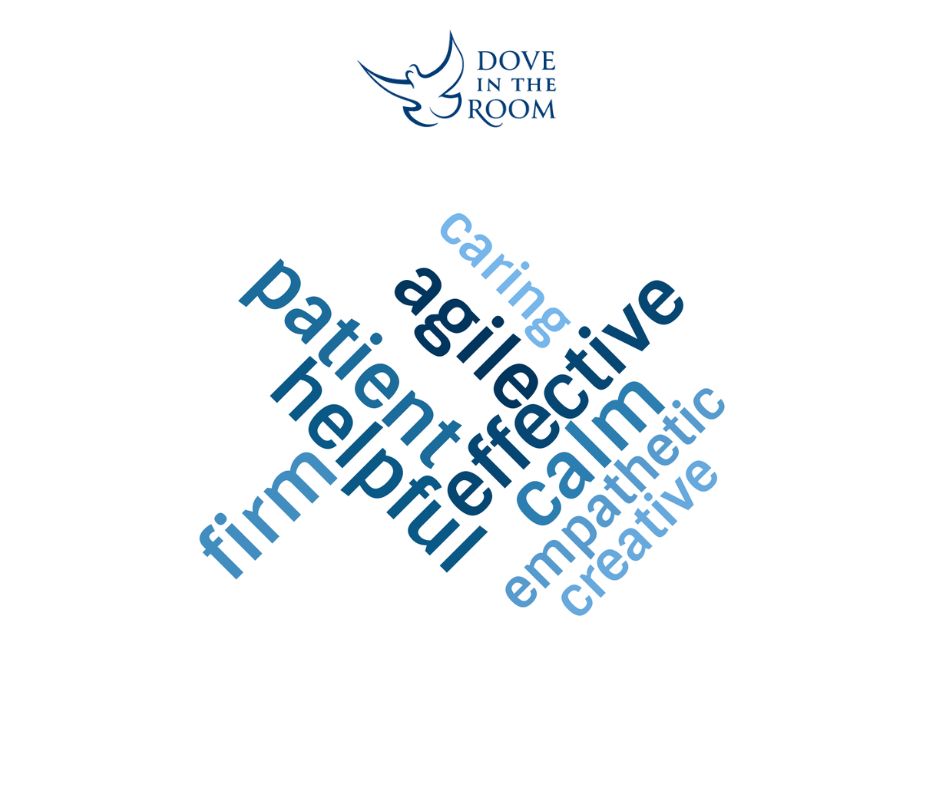I am often asked what my mediation style is. In this blog I describe my style so that you know what you will get if you engage me as your mediator.
My brand certainly evokes mixed reactions. I recently attended a mediation summer school where I met a very experienced mediator for the first time. Over lunch he told me that before he had met me, he asked himself, “what sort of a person calls themselves The Dove in the Room?” He went on to say that he had expected a wishy-washy, fluffy person, but it was clear on meeting me that I was not like that at all and that “I was completely on it“. I’m still not entirely sure what he meant but I think I got the seal of approval and he persuaded me to buy his book. Those who know me, know that I am definitely not soft. I am at heart a litigator, but I am now in recovery!
Before writing this, I looked through my feedback and testimonials to draw out some key themes. The feature image on this blog highlights some of the words people have used about me, but words alone can’t do justice to the question.
Overall, I would say that if you instruct me, you will be instructing a mediator who is comfortable and sensitive when working with emotional clients. I passionately believe that the most important thing is for a client to be given a space to be truly heard before the mediation day itself starts. I am very generous with my time to ensure this happens. I dedicate 90 minutes to a pre-mediation call with each party before the mediation. That includes half an hour with the lawyer and up to an hour with the client. I regard the pre-mediation call as an essential and invaluable part of the mediation process. It’s clear to me, and those who have instructed me, that the pre-mediation call greatly enhances the mediation experience for the clients and helps them calm their nerves before the day. It also saves hours on the day and tends to lead to shorter and less painful mediations.
Give the client a space to be heard before the mediation day
The pre-mediation call does more than that though. I use the call as an opportunity to hear from the client about what is important to them about the dispute. A few open questions tend to get to the heart of the matter immediately. One of the reasons why this is so effective is because the day before the mediation there is no pressure to move on and start negotiating. There are no messages for me to relay from the other room. In short, there is no noise in my head, and I have no other agenda. We don’t discuss any figures or possible settlement proposals. I am simply present and truly listening. Crucially, asking a client to speak in this context enables them to speak their truth from their core, without any attempt to persuade or defensive posturing by them or their lawyers (who are generally on mute at this point!).
Mediation is about more than money
Parties who come to mediation, especially to resolve an inheritance dispute, are not just coming to resolve the financial aspects of the matter. They are often seeking something more, whether it be acknowledgment, closure, peace, or something else. The psychiatrist and author, Gerald Jampolsky describes the human psyche as “having a preference for peace”. Every client I come across has suffered some form of loss, whether it be the loss of a loved one, a relationship or a fundamental belief. I believe that if done well, mediation plays a part in a client’s healing journey. I explain to clients that mediation is not about winning and losing. Winning does not heal you.
Start early and move forward, quickly
Once the mediation day itself starts, having invested so much time before the day, it is possible to hit the ground running much quicker. Having been truly heard and understood already, clients come to mediation willing to look forwards not backwards and start to look at ways to resolve the situation. I like to start my mediations as close to 9am as possible. With my model, negotiations often start by mid-morning. My record settlement time is 11:30am!
The role of the empathetic provocateur
Admittedly not all mediations are that smooth or easy and there often times when I have to be firm. At this stage I take on the role of an “empathetic provocateur”. I am not a believer in dwelling on the facts, the law and all the weaknesses of a client’s case. It’s not about who is right and who is wrong. Some discussion on the merits and risk is often helpful and necessary, especially where it’s clear that the clients haven’t really taken in the advice from their lawyers. I do recall a tumble weed moment in a mediation when a client said to me, “there are no holes in our case Julia”, following which their lawyer requested some time with their client alone. After a reality check, breakthrough followed. I truly believe that you can move a client towards settlement without assertively telling them all the reasons why they may lose.
A barrister once fed back after a mediation that I was “like a captain steering the ship safely through stormy seas” and another client said, “you were the Dove in the Room”. But my favourite testimonial came from a litigant in person, who said:
“Your professionalism and caring attitude to both parties has started us on the road to healing our relationship”.
I like to think that I offer more than just mediation. I offer clients an opportunity to tackle something very hard in a good way and for that to be the start of their healing journey. I also truly believe that the mediation process has evolved beyond the traditional model of one big mediation day. I am sharing the way I do things in the hope that more mediations are conducted in this way for the greater good.

